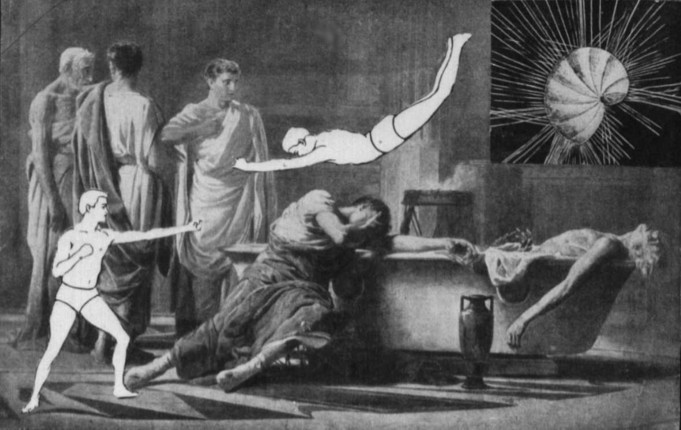.
Dance of the
Infidels
.

In a smoky room on
Manhattan’s west side midtown, two pianists ponder the bridge to a trim
new
tune. It’s late afternoon and the sun angles in through a break in the
curtains. One is sitting on an old leather arm chair, eyes closed,
humming the
introduction. The other is at the piano tuned to notes that he plays in
silence, fingers poised above the keys. He does this when he’s unsure,
yet
listening to the urges rising within him; urges that he usually
transforms so
well into music.
This goes on for quite
a while until his colleague snaps his fingers, stands up, steps to the
piano,
leans down and plays two chords. They sound awkward enough when
isolated but in
tandem add up to something that the tune can use; as much to offset its
harmonic as to tip the rhythm forward.
The originator of the
tune then jots down the notation, looks at it for a moment, whistles
between
his teeth, lips barely open, and plays the thing out.
That night, after the
first set at the club, while in the dressing room, the pianist tells
his band
that he’ll do the first song solo. It’s a new thing he’s written and he
wants
to try it out.
“I’ll play it. Then
you all follow, drummer, bass, sax, trumpet. We’ll do the repertoire
but start
up in that order: drum solo, bass and drum duet, trio, quartet. Take as
long as
you want. Then I’ll join in.”
They have a few
drinks, smoke a cigarette, snort some coke, talk a bit with several
journalists
who’ve dropped by with their ladies and lay back for a few more
minutes. Then
its curtain call.
The pianist walks on
stage, sits down on the piano bench, hands in his lap and waits for the
crowd
to quiet. He waits a little longer, placing his hands on the keys. Then
he
begins. When he gets to the bridge he realizes again how perfect it is;
just
what the tune needed; keeps the opening and closing sections
off-balance enough
to entice deeper listening. And he plays on as he wrote it: for a
memory, one
of several memories, that kept returning a few afternoons just as he
was
waking. Whether they were real or not, formed by events he experienced
in sleep
or by day, when he was conscious enough to know he was awake, isn’t
something
he can say.
He doesn’t split hairs
on such things either. He accepts them for what they are and how they
present,
and enjoys or dislikes them, or some portion of both, then moves on.
Be that as it may, he
senses that this memory, those memories, orbit about a dreadful sun
that burns
up through a vortex composed of clouds, rain, dust and bits of
petrified
lightning whose thin blue magnetic borders crackle lowly.
Amidst the centripetal
force of the vortex, which he no doubt creates, if only to stabilize
the tale
that this memory, these memories, tell, he sees this: He and his wife
are
walking along a trail beside a deep gorge. A body of water -- river,
lake, or
pond; it’s too small to be a lake from
so high up yet it could be – glitters far down at the
bottom of the gorge. Transfixed by the
glittering light reflected off the water, they forget where they are.
The trail
climbs and falls, turns and rises again toward a summit as far above as
the
water in the gorge below.
Sudden cool breezes
appear and vanish. Time escapes them. Their thoughts dwindle to the
regular
sway of their walk, the faint signature of their clothes rubbing
together, the
shallow pulse of their breathing. It is as if they have been here for
as long
as they have been alive. It is as if the trail, centuries old, were a
medicant
medium and they its servants. It is as if the scene they give birth to,
this
scene from that memory, these memories, conveys them to a second life,
a
separate parallel vivacity that in sharing, he absorbs, and as he does,
she does,
along with the scene from that memory, these memories.
It all happens ever so
slowly.
He knows then that
he’s been playing, that he is playing the new tune he wrote with that
bridge
his colleague came up with, and that the entire thing is just about to
end.
He ends it, sits up,
folds his hands into his lap and closes his eyes.
The audience, first
silent, not knowing how to respond, stunned a bit by the journey the
tune has
taken them on, breaks into scattered applause.
He swivels around.
“Dance of the
Infidels,” he says, “a new tune.”
Then the drummer walks
on with his sticks and brushes, sits at his kit, pauses and starts in…